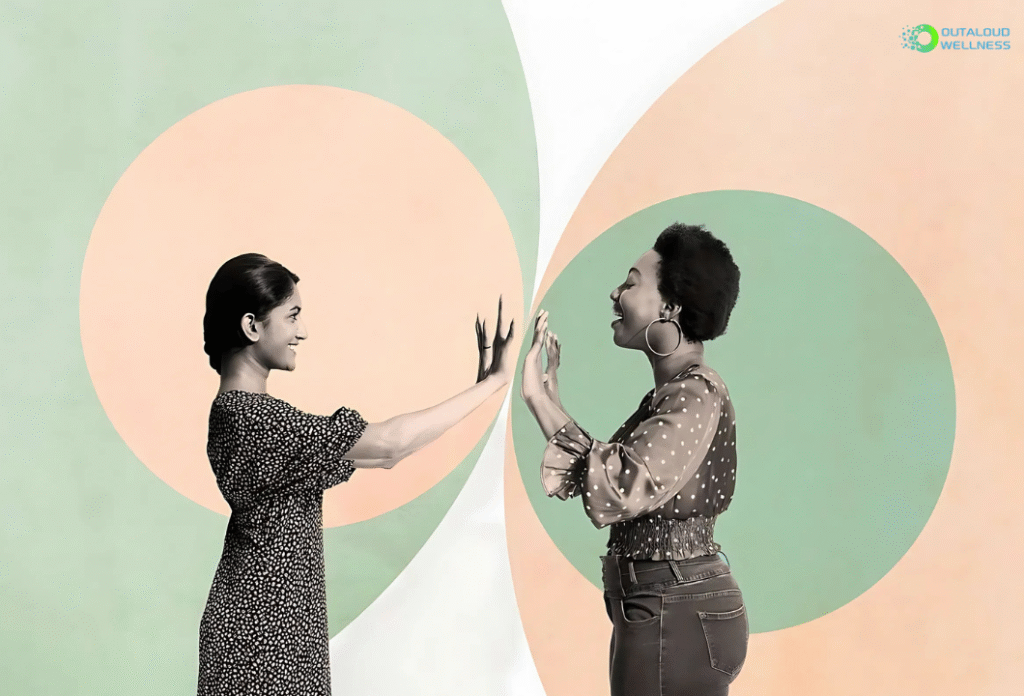
It was a rainy evening in Mumbai. One of our therapists had just wrapped up a long day filled with client sessions. As she finally sat down to unwind, her phone buzzed. A friend wanted help with a project… again. She wanted to say no, but she said yes. Later that night, she felt drained, resentful, and frustrated.
This is a situation many people find themselves in. At OutAloud Wellness, we work with clients every day who feel emotionally exhausted because they do not know how to set personal boundaries without guilt. But here is the truth: boundaries are not barriers. They are bridges to healthier connections, emotional safety, and stronger self-awareness.
What Are Personal Boundaries?
Personal boundaries are the invisible lines we draw to protect our energy, time, and emotional space. These are not rules to keep others away, but guides that tell others how we wish to be treated. Setting these boundaries is a key component of emotional maturity and maintaining integrity in relationships.
Think of them like traffic signals in a busy city like Mumbai. They are there to prevent chaos and promote smooth flow, not to restrict anyone’s journey.
Why Do We Feel Guilty?
Many people associate setting boundaries with selfishness or fear being labelled as rude. This guilt often stems from:
- Past experiences of rejection
- Cultural conditioning
- Fear of conflict
- A deep need for approval
At OutAloud Wellness, we offer relationship counselling and therapy sessions to help individuals identify the root of this guilt and transform it through guided self-awareness practices.
Step-by-Step Guide to Setting Personal Boundaries Without Guilt
1. Shift Your Perspective
Start by reminding yourself that setting personal boundaries is an act of self-respect and emotional maturity. It helps you stay aligned with your values and protects your emotional energy.
2. Know What Matters to You
Clarity is power. Ask yourself: What makes you feel drained? What gives you joy? Use mindfulness to increase self-awareness about your needs, and allow that awareness to guide your boundaries.
3. Practise Saying No Without Explanation
You do not owe anyone a long reason. A simple, kind “I cannot commit to that right now” is enough. It does not make you rude. It makes you honest.
4. Use Emotionally Safe Language
Swap blame with empathy. Say things like:
- “I value our time, but I need to rest tonight.”
- “I appreciate your offer, but I am not able to say yes right now.”
This promotes emotional safety in communication, helping others understand rather than feel rejected.
5. Be Consistent
Mixed signals confuse others. Stick to your decisions even when it feels uncomfortable. The more consistent you are, the more people respect your space.
6. Work With a Therapist
Setting boundaries becomes easier when you work with a trained professional. At OutAloud Wellness, our team provides therapy focused on emotional integrity, self-awareness, and relationship compatibility.
7. Reframe the Guilt
Guilt often appears when you put your needs first. Ask yourself: Am I harming someone or simply protecting myself? Setting boundaries is a declaration that your needs matter.
8. Start Small and Build
You do not have to overhaul your life overnight. Begin with a few simple changes:
- Stop answering work calls after hours
- Say no to social plans you do not want to attend
- Protect your alone time
Small steps build confidence.
Real Client Story (Name Withheld for Privacy)
One of our clients, a 29-year-old graphic designer in Mumbai, came to us feeling emotionally burnt out. She said yes to everything- extra work, family obligations, even favours from acquaintances. She had no time for herself and began experiencing panic attacks.
Through therapy, she learned to say:
- “I am not available today, but we can plan something for later.”
- “I need time to focus on myself.”
Today, she balances her life with clarity and confidence, thanks to emotional support, relationship counselling, and guided mindfulness practices.
Frequently Asked Questions About Setting Personal Boundaries
1. Is it wrong to prioritise myself?
No. It is healthy and necessary. Prioritising yourself helps you show up better for others.
2. Why do I feel selfish when I set a boundary?
Because you were not taught that your needs matter. Therapy can help you unlearn this belief.
3. How can I stop people from guilt-tripping me?
Acknowledge their feelings, but stand firm. For example: “I understand you are upset, but I cannot change my decision.”
4. What if someone gets angry?
It is okay. Their reaction is not your responsibility. Your job is to express yourself with honesty and kindness.
5. Can I set boundaries in a long-term relationship?
Yes. In fact, boundaries improve intimacy and emotional safety.
6. How do I communicate boundaries at work?
Say: “I am happy to help, but I need more time” or “I will not be available after work hours.”
7. Can boundaries change over time?
Yes. As your values, roles, or energy shifts, so will your boundaries.
8. What if I do not know where to begin?
Start with self-reflection or seek help through therapy for emotional maturity and self-awareness.
9. Will I lose people if I set boundaries?
You might. But you will also attract people who respect you. This is how you build compatibility and integrity in relationships.
10. How can OutAloud Wellness help me?
Our expert therapists guide clients through mindfulness-based therapy, emotional maturity coaching, and personalised boundary-setting techniques.
Final Thoughts
Setting personal boundaries without guilt is not a destination. It is a journey of learning to honour your emotional needs without shame. It requires courage, clarity, and a commitment to your well-being.
At OutAloud Wellness, we believe you deserve to live with emotional integrity, self-awareness, and strong relationship compatibility.
If you are ready to begin, we are here for you.📞 Call us at +91 81696 90400
🌐 Visit www.outaloud.com
Let us help you create space for a calmer, more empowered life.
